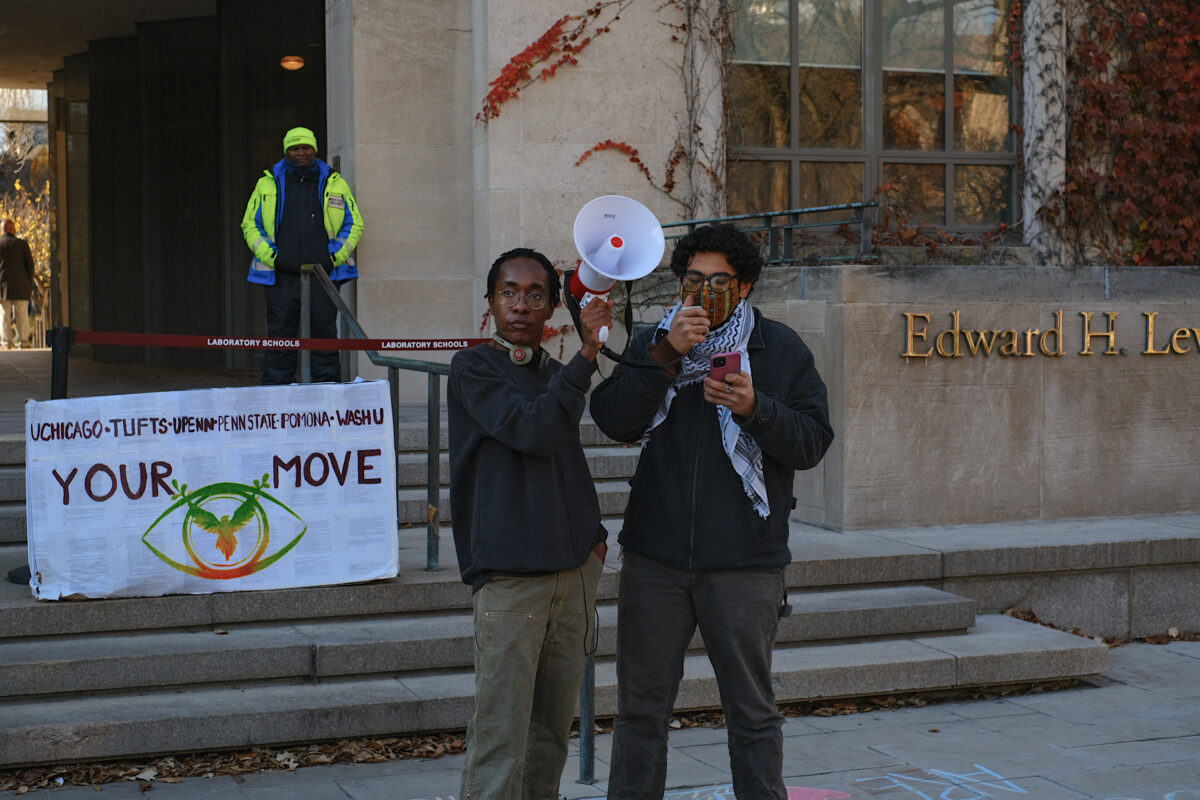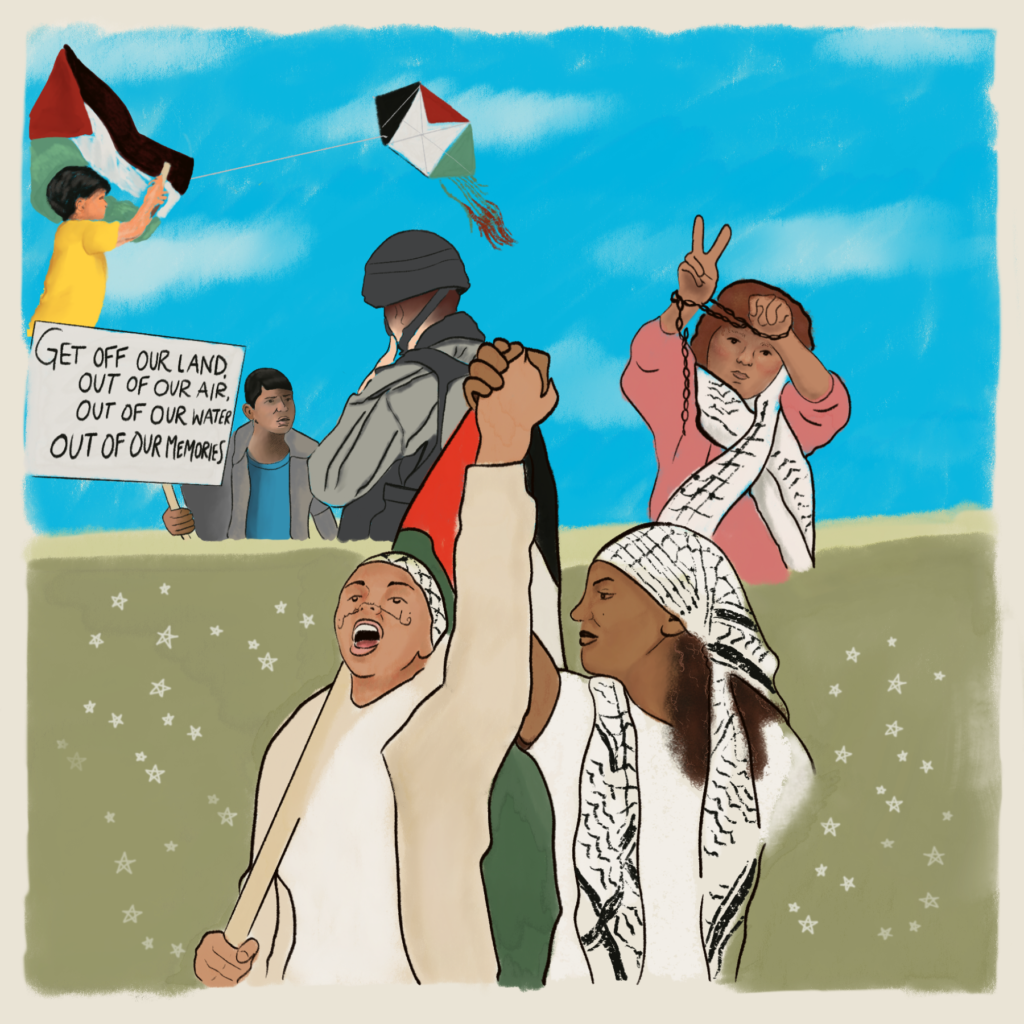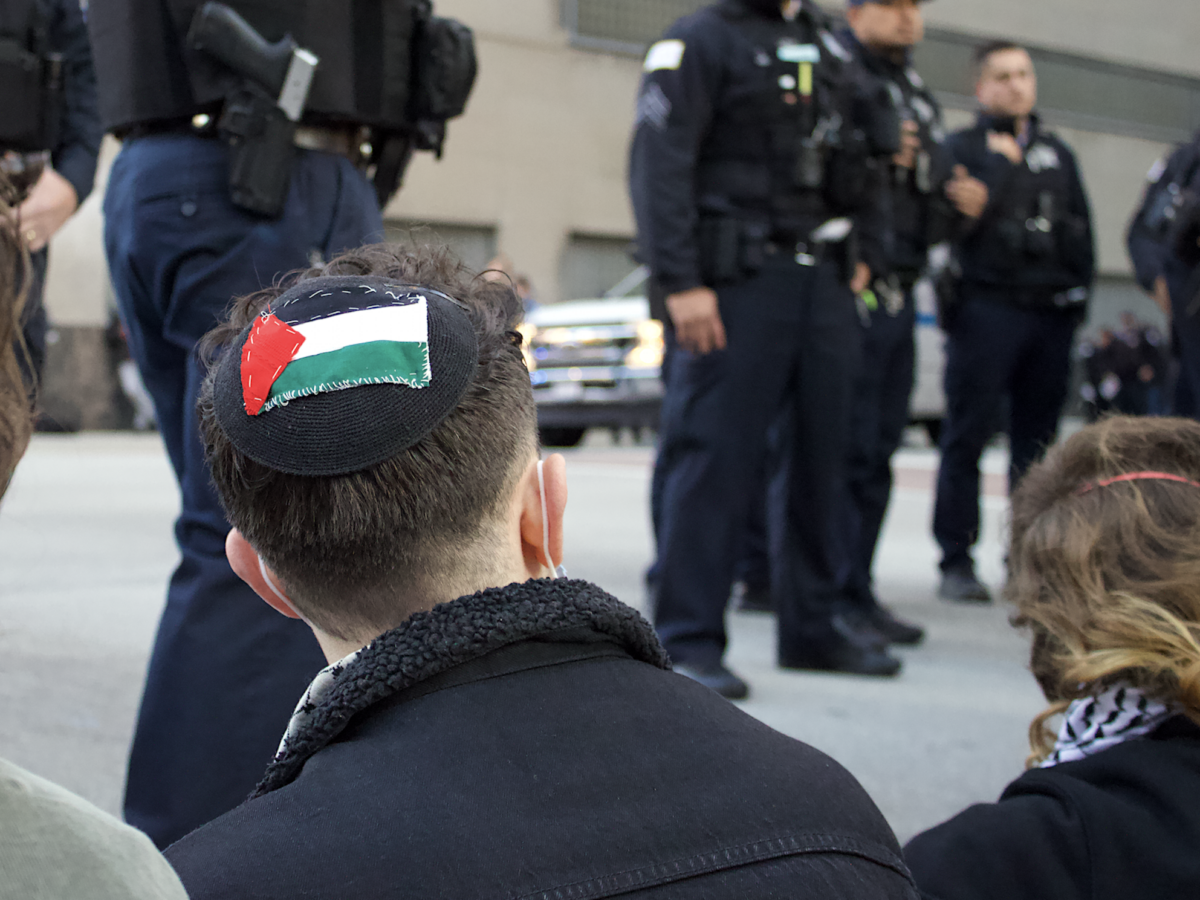University of Chicago students staged a sit-in at the admissions office last month to call for a public meeting with President Paul Alivisatos. Led by organizers from UChicago United for Palestine (UCUP)—a coalition of campus groups that includes CareNotCops, UChicago Students for Justice in Palestine, and the National Lawyers Guild at the university—the protesters demanded transparency around the university’s investments and its complete divestment from companies that send weapons to Israel. After several hours, twenty-six students and two faculty members were arrested.
The sit-in was part of a wave of campus protests of Israel’s ongoing bombing of Gaza that have erupted at universities across the nation. On October 7, Hamas launched cross-border attacks that killed about 1,200 people, and took hundreds of hostages. In response, Israel began a massive bombing campaign that has killed at least 17,000 people, two-thirds of them women and children, according to the Health Ministry in Gaza.
Students at more than 100 colleges and high schools across the U.S. and Canada participated in an October 25 national walkout to call for a ceasefire. In universities, such calls are often accompanied by demands that their institutions cut ties with weapons and defense contractors. Before the November 9 action at U of C, UCUP had been tabling daily at the university’s quadrangle and presenting their demands to the administration. The group’s organizers said they see these movements as descended from a lineage of campus antiwar struggles and believe that students are particularly well-positioned to effect change towards achieving an end to Israel’s occupation in Palestine.
The U of C has not publicly disclosed whether it currently has investments in aerospace and defense manufacturers, but in 2020 the Chicago Maroon, the student newspaper, reported that the university’s broad portfolio has in the past included Boeing, Northrop Grumman, and Raytheon, which are some of the top companies in that sector.
The university responded to student organizers in a statement (which was also provided to the Weekly by U of C’s press office after this story was published) that reiterated the Kalven Report, which established U of C’s institutional neutrality toward political issues. The report, written in 1967 as protests against the Vietnam War were roiling college campuses, established a “heavy presumption against the university…modifying its corporate activities to foster social or political values.” U of C has since referenced the report in response to calls for divestment from apartheid South Africa in the 1980s, the Darfur genocide in the early 2000s, and investments in fossil fuels in recent years.
“What we want to emphasize is that it’s not just divestment that’s political; investment is also political,” the organizer said.
Universities primarily make investments via their endowment funds, among other initiatives. Some are invested in hedge funds or private equity, generating additional income. The Nation reported in 2016 that hedge-fund investing has become common practice for schools, especially those with the largest endowments. The article estimated in 2015 that over $100 billion of educational endowment money nationwide went to hedge funds.
Ali, an organizer with the antiwar activist group Dissenters, which helped organize the National Student Walkout, told the Weekly that divestment is both a tactic and a movement that has been used in liberation struggles from apartheid South Africa to Palestine. Calls for divestment from Israeli companies are coupled with additional tactics in the Boycott, Divestment, and Sanctions (BDS) movement. Thirty-seven states, including Illinois, have passed anti-BDS laws, with New Hampshire becoming the latest in July. In February, the Supreme Court declined to hear a challenge to one such law in Kansas.
“Universities, at the end of the day, are profit-making institutions, and so universities have the incentive to expand their endowment,” Ali said. “We’ve all seen these really disgusting statistics of how the stocks at Lockheed Martin, at Raytheon, at Northrop Grumman, at Boeing skyrocket into the thousands as each bomb was dropped on Afghanistan and Iraq during the Iraq wars and the invasion of Afghanistan.” Since October 7, the stocks of Boeing, Northrop Grumman, Raytheon, and Lockheed Martin have risen by 25 percent, 13 percent, 19 percent, and 12 percent, respectively.
Dissenters targets universities because its members see these institutions as increasing the profits of arms manufacturers. “If enough institutions like universities sell their stocks in these weapons manufacturers, then it sends a message that . . . your profits will continue to plummet so long as you are signing off and literally arming the world’s biggest warmongers,” Ali said.
In addition to U of C, students at Loyola and DePaul also participated in the national student walkout. Northwestern students held a walk-out on October 25 and staged a die-in on November 9 to call for divestment from any companies with ties to the Israeli military.
Many of Chicago’s universities are private, which makes uncovering the details around their endowments and investments difficult. For the University of Illinois, that data is more accessible. A 2023 annual report found significant percentages of the university’s endowment fund have been invested in entities managed by BlackRock, which via its U.S. Aerospace and Defense fund, among others, has held multi-billion-dollar stakes in some of the biggest weapons manufacturers.
Jenin Alharithi, the vice president of the University of Illinois at Chicago’s (UIC) chapter of SJP, told the Weekly that in addition to investments made through the endowment, UIC has engaged in partnerships that bolster the weapons apparatus, such as one with the Illinois Defense Manufacturing Consortium (ILDMC), a group that aims to strengthen the Illinois defense sector with data solutions. One such partner in the ILDMC is the Rockford Area Economic Development Council (RAEDC). “What RAEDC oversees is the manufacturing plants of Woodward” a Colorado-based aerospace manufacturer that has a facility in Niles, Althari said. Yittayih Zelalem, director of UIC’s Nathalie P. Voorhees Center for Neighborhood and Economic Development, is the ILD team’s coordinator.
Other UIC partnerships include aerospace and defense contractor Boeing and Caterpillar, which manufactures armored bulldozers used by the Israeli Defense Forces.
Alharithi said that UIC has one of the largest Palestinian, Muslim, and Arab student populations in the U.S., and because of this she feels a particular responsibility to mobilize against the university’s investment, calling it “vital to the national student movement.”
UIC’s SJP chapter led an action on November 16 at a Board of Trustees meeting to demand the university divest from “any entity that funds Palestinian genocide,” Alharithi said. The university did not publicly acknowledge the protesters’ demands, but in 2018, UIC president Tim Killeen released a statement that said, “actions such as those espoused by BDS would damage academic freedom and may have an intended or unintended anti-Semitic effect which we utterly condemn.” UIC’s press office declined to comment for this story.
Related story
University administrations across the U.S. have responded to calls for divestment in a range of ways, from issuing critical statements to suspending organizations.
Columbia University suspended both the SJP and Jewish Voice for Peace (JVP) chapters for the rest of the semester, alleging that they violated campus rules by holding an unauthorized event after the groups held a student walkout. George Washington University (GWU) suspended its SJP chapter for three months after members projected statements supportive of Palestine, including one calling the university “complicit in genocide in Gaza,” on a campus building. One Jewish GWU student tweeted that the protest made them “worry about physical safety.”
At the University of Massachusetts, fifty-six students and a university employee were arrested after an hours-long sit-in; a university spokesperson released a statement that said the students’ demands didn’t align with UMass’s public positions and policies. Last month, Brandeis University stated it will no longer recognize its SJP chapter, which the university said “openly supports Hamas,” and banned the chapter from operating on campus. At the University of Michigan (UMich), forty students were arrested at a sit-in where protesters alleged police were violent.
“The most consistent response that we have seen by universities has been a morally reprehensible and legally indefensible suppression of Palestine student organizing and anti-imperialist student organizing,” Ali said. He added that Congress and state representatives have accused pro-Palestinian movements of being sources of hate.
In October, Florida governor Ron DeSantis attempted to deactivate all student chapters of SJP in Florida. In late November, the House passed a resolution condemning Hamas that also said “denying Israel’s right to exist is a form of antisemitism.” Kentucky Rep. Thomas Massie cast the lone “no” vote (Palestinian-American representative Rashida Tlaib, of Michigan, voted “present”), explaining he did so because the resolution “equates anti-Zionism with antisemitism.” On Tuesday, House Republicans did that explicitly, passing a resolution that “clearly and firmly states that anti-Zionism is antisemitism.” Illinois Rep. Jan Schakowsky and New York Rep. Jerry Nadler, who both are Jewish, condemned the resolution ahead of the vote.
Ali says these responses ultimately strengthen the movement, whose organizers “refuse to be defined by repression, and instead use it as energy to propel and fuel the robust movement that they are waging for divestment, and for Palestinian freedom.” There’s some evidence that’s true. A Florida SJP chapter filed a lawsuit against DeSantis for allegedly violating their free speech; twenty-one elected officials signed a letter calling for Columbia to reinstate SJP and JVP; and Columbia, Barnard, and Brandeis, alumni have withheld donations over university responses to protesters.
The movement appears to be growing, as well. More than seventy student organizations have joined a coalition called “Columbia University Apartheid Divest,” and the UMich divestment coalition expanded to a total of sixty organizations called TAHRIR. More than 2,000 UMich alumni withheld nearly $3 million in donations in November, and a UIC student trustee joined in the calls for divestment.
“Students have effectively reclaimed a narrative from an institution which benefits from racist, Islamophobic dehumanization of Palestinians and Arabs and Muslims,” Ali said. “They’ve reclaimed the narrative and instead centered the rights and freedoms of the Palestinian people.”
He added that nearly 100 student governments have passed resolutions calling for university divestments since October 7.
Historically, universities have committed to divestment only after mounting pressure by student organizers. Harvard divested from fossil fuels in 2021 after years of calls to do so from climate organizers. Columbia became the first university to divest from private prisons in 2015. The University of California Regents Board, which represents ten campuses, voted to divest $3.1 billion from businesses with ties to apartheid South Africa in 1986, triggering the beginning of the end of the apartheid regime in 1990.
Student organizing is not without its risks. Individuals speaking out have been subject to alleged employment discrimination, defamation, doxxing, and death threats. At the University of Michigan, the university canceled an election for two student ballot proposals. One called for UMich “to acknowledge that 75+ years of Palestinian-Israeli tensions have been created through systems of settler colonialism,” and another, which countered the first, condemned Hamas for the October 7 attacks on Israeli civilians.
Beyond campus quadrangles, protests against Israel’s bombing of Gaza have taken place in Chicago and around the world in a burgeoning movement that includes Black Lives Matter organizers, Indigenous protesters, and Jewish activists. Ali said that it is incumbent upon those in the movement to persist because the death toll in Gaza continues to climb.
“War and militarism oppress everyone. They oppress Palestinians, they oppress Jewish people, they oppress Black people, they oppress all marginalized communities,” Ali said. “Our response must be hand in hand, targeting occupation and war wherever it materializes because we know that its presence is a threat to all of us, and its eradication means freedom for all of us.”
Kevin Hu is a multidisciplinary writer, tech worker, and a recent Chicago re-transplant. You can find more of their writing at www.kevinhu.dev.






I am 69 and have been active for close to 40 years working professionally , as a volunteer and community member on various aspects of Economic and Social Justice with a variety of community organizations.
I have never encountered a group of people so ignorant, uniformed, and are actually a detriment for the so called Palestinians they say they are trying to help.
Yo much to explain in a comment but there is one metric, not a single voice beginning on the 8 th for Hamas to release the hostages to avoid bombing and invasion. Could not be more self defining locally or world wide that these people have a self serving agenda regarding Jews, no you cannot separate Israel and Jews.
Thank you
Jeff
This is a very well-written article. Thank you for drawing attention to the resistance to university investment in warfare and the student support for Palestinian freedom.